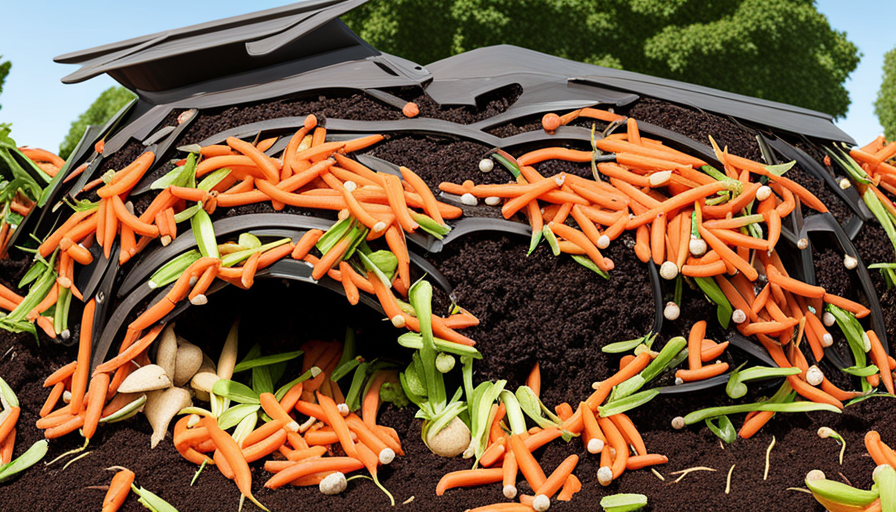So, you’re thinking about composting and wondering if quorn can be added to your compost pile. Composting is a great way to reduce waste, improve soil health, and grow healthy plants. But before you start adding any organic matter to your compost heap, it’s important to understand the basics of composting.
Composting is the process of breaking down organic material into nutrient-rich soil that can be used for gardening or farming. This process requires four key ingredients: carbon-rich materials (such as leaves or straw), nitrogen-rich materials (such as food scraps or grass clippings), water, and air. When these ingredients are combined in the right proportions and conditions, beneficial microbes break down the organic matter into a rich humus that nourishes plants and improves soil structure.
Now let’s dive into whether quorn can be added to your compost pile!
Key Takeaways
- Quorn can be composted and is an eco-friendly option.
- Composting with Quorn may take longer due to its high protein content.
- Composting with Quorn can yield nutrient-rich compost and promote a more sustainable lifestyle.
- Quorn is a sustainable and healthy alternative to traditional meat that requires less space and energy than meat production and has a smaller carbon footprint.
Understanding Composting Basics
You can easily compost your food scraps and yard waste by mixing them together in a bin or pile. Composting benefits the environment by reducing the amount of waste that ends up in landfills, where it contributes to greenhouse gas emissions.
Composting also produces nutrient-rich soil that can be used to grow beautiful plants and vegetables. The composting process involves microbes breaking down organic matter into smaller pieces. These microbes require oxygen, water, and a balanced mix of carbon (brown) and nitrogen (green) materials to thrive.
Brown materials include dry leaves, shredded paper, and straw, while green materials include fruit and vegetable scraps, grass clippings, and coffee grounds. By combining these materials in a compost bin or pile and regularly turning them over to aerate the mixture, you can create rich soil that will benefit your garden.
What is Quorn and How is it Made
Crafted from humble fungi, Quorn is a meat substitute that has taken the culinary world by storm. It was first developed in the 1960s by scientists who were looking for alternative sources of protein to feed a growing population.
Quorn production involves fermenting a type of fungus called Fusarium venenatum in large vats until it reaches a meat-like texture. Meat substitutes like Quorn are becoming increasingly popular due to concerns over animal welfare and environmental sustainability. Unlike traditional meat production, which requires vast amounts of land, water, and resources, Quorn can be produced using much less space and energy.
Additionally, since it is made from fungi instead of animals, it has a smaller carbon footprint and produces fewer greenhouse gas emissions.
Can Quorn be Composted?
With its plant-based origins, Quorn has the potential to be environmentally-friendly, and you may wonder whether it’s compostable. The answer is yes – Quorn can be composted!
Composting Quorn has several benefits. Firstly, it reduces landfill waste. Instead of throwing away your unused or expired Quorn products, you can add them to your compost bin. This helps reduce the amount of organic waste that goes into landfills.
Secondly, composted Quorn enriches soil fertility. When added to the soil, it releases essential nutrients that promote healthy plant growth. This means better yield for your plants and vegetables.
Lastly, composting Quorn is eco-friendly. By doing so, you’re reducing greenhouse gas emissions from landfills while also promoting a more sustainable lifestyle.
Tips for Composting with Quorn
Transforming leftover Quorn into nutrient-rich soil is like unlocking the secret to a flourishing garden. However, composting with Quorn can present some challenges.
Due to its high protein content, Quorn may take longer to decompose than other food waste. To speed up the process, consider chopping it into smaller pieces or mixing it with other organic materials such as leaves or grass clippings.
Despite these challenges, incorporating Quorn into your compost pile can yield nutrient-rich compost that will benefit your plants and reduce your environmental impact. Composting with Quorn also helps divert waste from landfills where it would produce methane gas – a potent greenhouse gas.
So next time you have leftover Quorn, don’t throw it away! Instead, add it to your compost pile and watch your garden thrive.
Frequently Asked Questions
Is it safe to compost quorn with other food waste?
When composting Quorn, ensure it’s mixed with other food waste before adding to the pile. Quorn is safe to compost and offers nutritional benefits for gardening due to its high protein content.
How long does it take for quorn to decompose in a compost pile?
Picture a compost pile with Quorn nestled inside. The Quorn decomposition rate can be slow due to its protein content, posing composting challenges. It can take several months for Quorn to fully decompose in a compost pile.
Can I use quorn compost for growing vegetables?
Yes, you can use Quorn compost as fertilizer for growing vegetables. Vegetable growth with Quorn compost has been shown to be successful due to its high nitrogen content and ability to improve soil structure.
Are there any special considerations for composting quorn in a small space or indoors?
When composting in a small space or indoors, consider using composting methods that are odor-free and easy to maintain. To control the smell, use carbon-based materials like shredded paper or coconut coir.
Can quorn packaging be composted along with the quorn itself?
Don’t let Quorn packaging go to waste! It’s compostable, so add it to your compost pile along with any leftover Quorn. Composting Quorn helps reduce food waste and creates nutrient-rich soil for your plants.

